
0
+
Google Reviews

0
+
4.6 (2199 Rating)
CYBER & INFORMATION SECURITY COMBO includes Cyber Security | Forensic Security | Ethical Hacking | Application Security | Network Security | Linux | Networking. The Cyber & Information security course offers a concise yet comprehensive exploration of vital topics in digital security. Participants will gain practical skills in protecting systems, conducting forensic investigations, and ethical hacking practices. This course is ideal for those seeking to enter the cybersecurity field or enhance their expertise in safeguarding digital assets.
Duration of Training : 140 Hours
Batch type : Weekdays/Weekends
Mode of Training : Classroom/Online/Corporate Training


Curriculum Designed by Experts
Module 1: Introduction to Networking
Module 2: IP Addressing and Subnetting
Module 3: Network Protocols and Services
Module 4: Ethernet and Network Topologies
Module 5: Cisco Device Configurations
Module 6: Advanced Network Configurations
Module 7: Software-Defined Networking (SDN)
Module 1: Introduction to Red Hat Enterprise Linux (RHEL)
Module 2: User and Group Management
Module 3: File System Management
Module 4: Package Management with yum and dnf
Module 5: Security Fundamentals
Module 6: Network Services and SSH
Module 7: Introduction to System Administration Tools
Module 8: Basic Scripting
Module 9: Cronjob Scheduling
Module 10: Hands-on Labs Throughout the course, participants will engage in hands-on labs in a virtualized Red Hat environment. These labs will reinforce theoretical concepts through practical exercises, allowing them to gain experience with core administration tasks, basic scripting, and configuring cronjobs.
Module 1: Introduction to Web Applications
Practical Lab: Setting Up Burp Suite and OWASP ZAP, Intercepting and Analyzing Web Traffic, Session Management Testing.
Module 2: Information Gathering
Practical Lab: Information Gathering Using Various Tools and Techniques, Performing Google Hacking Searches, Analyzing Shodan Search Results.
Module 3: Cross-Site Scripting (XSS)
Practical Lab: Identifying and Exploiting XSS Vulnerabilities, Crafting XSS Payloads, Implementing XSS Mitigation Techniques.
Module 4: SQL Injection (SQLi)
Practical Lab: Performing SQL Injection Attacks, Extracting Data from Databases, Implementing Parameterized Queries to Mitigate SQL Injection.
Module 5: Authentication and Authorization
Practical Lab: Testing Authentication and Authorization Mechanisms, Exploiting Authentication and Authorization Flaws, Implementing Strong Authentication and Authorization Controls.
Module 6: Session Security & CSRF
Practical Lab: Session Hijacking and Fixation Attacks, Crafting and Exploiting CSRF Vulnerabilities, Implementing CSRF Protection Measures.
Module 7: Remote Code Execution (RCE)
Practical Lab: Exploiting Remote Code Execution Vulnerabilities, Gaining Shell Access, Implementing Controls to Prevent RCE Attacks.
Module 8: HTML5 Security
Practical Lab: Exploiting HTML5 Features for Security Attacks, Mitigating HTML5 Security Risks.
Module 9: File and Resource Attacks
Practical Lab: Exploiting File Inclusion and Unrestricted File Upload Vulnerabilities, Implementing Security Controls to Prevent File-Based Attacks.
Module 10: Other Attacks
Practical Lab: Performing Command Injection Attacks, Manipulating Prices in Web Applications, Implementing Countermeasures Against DoS Attacks.
Module 11: Web Services Security
Practical Lab: Assessing Web Services Security, Exploiting Web Service Vulnerabilities, Implementing Security Controls for Web Services.
Module 12: XPath Injection
Practical Lab: Exploiting XPath Injection Vulnerabilities, Implementing Defenses Against XPath Injection Attacks.
Module 13: Penetration Testing Content Management Systems (CMS)
Practical Lab: Penetration Testing CMS Platforms, Exploiting CMS Vulnerabilities, Implementing Security Controls for CMS.
Module 14: Penetration Testing NoSQL Databases
Practical Lab: Penetration Testing NoSQL Databases, Exploiting NoSQL Vulnerabilities, Implementing Security Measures for NoSQL Databases.
Each module includes practical labs to reinforce theoretical concepts and provide hands-on experience with various tools and techniques. These labs allow participants to apply their knowledge in a controlled environment, gaining valuable skills and experience in web application security testing.
Module 1: Introduction to Network Security
Module 2: Penetration Testing Framework – Kali Linux
Module 3: Analyzing Network Traffic
Module 4: Packet Analysis with Tshark
Module 5: Detecting Live Systems and Analyzing Results
Module 6: Nmap Advanced Port Scan
Module 7: Metasploit: Introduction to Exploitation
Module 8: Dictionary & Password Attacks
Module 9:
FTP Penetration Testing
SSH Penetration Testing
Telnet Penetration Testing (if applicable)
SMTP Penetration Testing
DNS & DHCP Penetration Testing
NetBIOS & SMB Penetration Testing
MySQL Penetration Testing (if applicable)
Remote Desktop Penetration Testing
Module 10: Windows Privilege Escalation
Module 11: Linux Privilege Escalation
Module 22: Covering Tracks & Maintaining Access
Course completion certificate and Global Certifications are part of our all Master Program
Course completion certificate and Global Certifications are part of our all Master Program
Course completion certificate and Global Certifications are part of our all Master Program
Enrolling in training for the AWS Certified Developer Associate course provides you with in-demand skills such as developing, deploying, and debugging cloud-based applications. The training focuses on AWS services, best practices, and troubleshooting, enhancing your expertise in cloud development and career opportunities.
Enrolling in AWS Certified Developer Associate Course Training opens doors to career opportunities like cloud developer, DevOps engineer, and solutions architect. The certification validates your AWS skills, giving you an excellent choice for jobs using the cloud in today's competitive IT market.
AWS Certified Developer Associate Course Training is essential for cloud adoption. It equips you with skills to develop, deploy, and manage AWS applications, accelerating cloud transitions. Having this certification guarantees that you can use AWS tools. driving successful cloud adoption strategies.
AWS Certified Developer Associate Course Training enhances scalability and flexibility by imparting knowledge on how to create scalable, dynamic AWS apps. This certification ensures developers can optimize resources and handle growth efficiently, making them experts in cloud infrastructure management.
AWS Certified Developer Associate Course Training focuses on cost management by teaching how to build and optimize applications on AWS efficiently. This certification helps you reduce expenses, monitor resource usage, and implement best practices for cost-effective cloud solutions, making you a valuable asset.
Course for AWS Certified Developer Associates Essential security and compliance skills are covered in training. Learn how to secure applications, manage AWS resources, and ensure compliance with industry standards. This certification prepares you to build safe, compliant cloud solutions in today’s tech-driven world.
Radical Technologies is the leading IT certification institute in Pune, offering a wide range of globally recognized certifications across various domains. With expert trainers and comprehensive course materials, it ensures that students gain in-depth knowledge and hands-on experience to excel in their careers. The institute’s certification programs are tailored to meet industry standards, helping professionals enhance their skillsets and boost their career prospects. From cloud technologies to data science, Radical Technologies covers it all, empowering individuals to stay ahead in the ever-evolving tech landscape. Achieve your professional goals with certifications that matter.
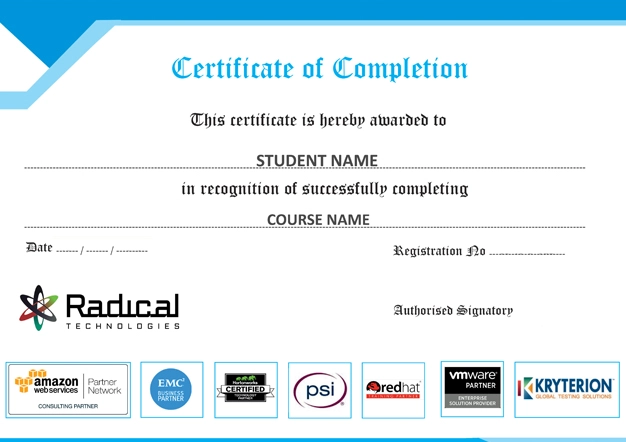


At Radical Technologies, we are committed to your success beyond the classroom. Our 100% Job Assistance program ensures that you are not only equipped with industry-relevant skills but also guided through the job placement process. With personalized resume building, interview preparation, and access to our extensive network of hiring partners, we help you take the next step confidently into your IT career. Join us and let your journey to a successful future begin with the right support.
At Radical Technologies, we ensure you’re ready to shine in any interview. Our comprehensive Interview Preparation program includes mock interviews, expert feedback, and tailored coaching sessions to build your confidence. Learn how to effectively communicate your skills, handle technical questions, and make a lasting impression on potential employers. With our guidance, you’ll walk into your interviews prepared and poised for success.
At Radical Technologies, we believe that a strong professional profile is key to standing out in the competitive IT industry. Our Profile Building services are designed to highlight your unique skills and experiences, crafting a resume and LinkedIn profile that resonate with employers. From tailored advice on showcasing your strengths to tips on optimizing your online presence, we provide the tools you need to make a lasting impression. Let us help you build a profile that opens doors to your dream career.

Infrastructure Provisioning
Implementing automated infrastructure provisioning and configuration management using Ansible. This may include setting up servers, networking devices, and other infrastructure components using playbooks and roles.

Applications Deployment
Automating the deployment and orchestration of applications across development, testing, and production environments. This could involve deploying web servers, databases. middleware, and other application components using Ansible

Continuous Integration
Integrating Ansible into CI/CD pipelines to automate software. build, test, and deployment processes. This may include automating the creation of build artifacts, running tests, and deploying applications to various environments.

The Cyber Security Course at Radical Technologies transformed my career. The hands-on training and expert guidance prepared me thoroughly for the industry.
I enrolled in the Ethical Hacking Course and was amazed by the depth of knowledge and practical skills I gained. The instructors are top-notch!
Radical Technologies' Cyber Security Certification Course gave me the edge I needed in the job market. I highly recommend it to anyone looking to advance in cybersecurity.
The flexible online classes allowed me to balance my studies with work. The Cyber Security Course Online is comprehensive and well-structured.
I was impressed by the job assistance provided. Thanks to the Cyber Security Training and Placement program, I secured a job right after completing my course.
The Ethical Hacking Training Course at Radical Technologies is the best in Pune. The hands-on labs and real-world scenarios made learning effective and enjoyable.
Radical Technologies offers the best Cyber Security Classes in Pune. The instructors are knowledgeable and the course material is up-to-date.
The Cyber Security and Ethical Hacking Course was a game-changer for me. The detailed curriculum and practical sessions were exactly what I needed.
I completed the Cyber Security Certification Course and felt fully prepared for my certification exam. The training was thorough and the support was excellent.
The affordable course fees at Radical Technologies allowed me to pursue my dream of becoming a cybersecurity professional without breaking the bank.
The Ethical Hacking Classes were engaging and informative. The instructors were always available to clarify doubts and provide additional resources.
I appreciated the personalized attention I received during the Cyber Security Training. The small class sizes ensured that every student got the help they needed.
The Cyber Security Course in Pune at Radical Technologies is unmatched. The practical approach to learning and industry insights provided invaluable experience.
The online ethical hacking training in Pune was perfect for my busy schedule. I could learn at my own pace and still receive excellent support from the instructors.
Radical Technologies' Network Security Training covered everything I needed to know. The comprehensive curriculum and practical labs were fantastic.














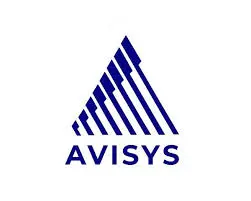










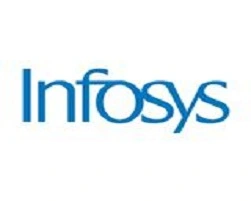
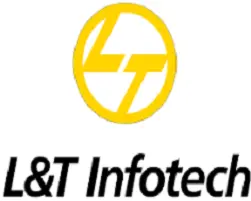
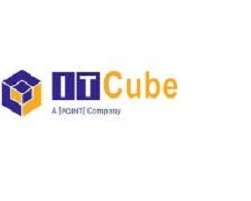


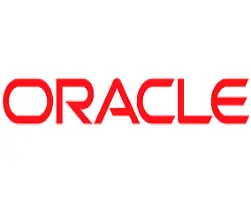










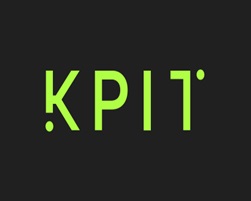

Cyber Security refers to the practice of protecting systems, networks, and programs from digital attacks. These attacks are usually aimed at accessing, changing, or destroying sensitive information, extorting money from users, or interrupting normal business processes. It’s important because it helps to safeguard personal data, maintain trust, and ensure the smooth operation of digital infrastructures.
Common types of cyber attacks include phishing, ransomware, malware, man-in-the-middle attacks, denial-of-service (DoS) attacks, SQL injection, and zero-day exploits. Each type has its own methods and targets but generally aims to compromise data integrity, confidentiality, or availability.
To protect your home network, use strong, unique passwords for all devices and accounts, enable WPA3 encryption on your Wi-Fi, keep your devices and software up to date, use antivirus and anti-malware software, disable remote management features, and be cautious about the websites you visit and the links you click.
Cyber Security focuses specifically on protecting electronic data from cyber threats, while Information Security is a broader term that encompasses the protection of all forms of information, including physical and digital data, from unauthorized access, use, disclosure, disruption, modification, or destruction.
A firewall is a network security device that monitors and filters incoming and outgoing network traffic based on an organization’s previously established security policies. It acts as a barrier between a trusted internal network and untrusted external networks, such as the internet, to prevent unauthorized access and cyber threats.
Best practices for creating strong passwords include using a mix of upper and lower case letters, numbers, and special characters; making passwords at least 12 characters long; avoiding easily guessable information like birthdays or common words; and using a unique password for each account. Using a password manager can also help generate and store strong passwords.
Two-factor authentication (2FA) is a security process in which users provide two different authentication factors to verify their identity. This adds an extra layer of security by requiring not just a password, but also a second factor, such as a text message code or a fingerprint scan. It significantly reduces the risk of account breaches.
Signs of malware infection include slow computer performance, frequent crashes, unusual pop-up ads, programs opening and closing automatically, changes to your homepage or search engine, and unauthorized charges on your accounts. Running a full scan with reliable antivirus software can help detect and remove malware.
If you suspect a data breach, immediately change all your passwords, monitor your accounts for unusual activity, report the breach to the relevant authorities and your service providers, and consider using identity theft protection services. Additionally, ensure that your systems are updated and scanned for vulnerabilities.
Regular software updates are crucial because they often include patches for security vulnerabilities that cybercriminals could exploit. By keeping your software, operating systems, and applications up to date, you ensure that you have the latest security defenses in place to protect against known threats.
Yes, SAP offers certification exams for SAP WM, which validate your proficiency in using the SAP WM module.
The syllabus typically covers topics such as warehouse structure, master data, goods movement, storage types, picking strategies, and reporting in SAP WM.
Some institutes offer online access to course materials for registered participants, allowing for self-paced learning.
You can enroll in a SAP WM training course by contacting the institute offering the course or by registering through their website.
Yes, SAP WM training is designed to accommodate beginners with basic knowledge of SAP ERP systems and logistics concepts.
Ambegaon Budruk | Aundh | Baner | Bavdhan Khurd | Bavdhan Budruk | Balewadi | Shivajinagar | Bibvewadi | Bhugaon | Bhukum | Dhankawadi | Dhanori | Dhayari | Erandwane | Fursungi | Ghorpadi | Hadapsar | Hingne Khurd | Karve Nagar | Kalas | Katraj | Khadki | Kharadi | Kondhwa | Koregaon Park | Kothrud | Lohagaon | Manjri | Markal | Mohammed Wadi | Mundhwa | Nanded | Parvati (Parvati Hill) | Panmala | Pashan | Pirangut | Shivane | Sus | Undri | Vishrantwadi | Vitthalwadi | Vadgaon Khurd | Vadgaon Budruk | Vadgaon Sheri | Wagholi | Wanwadi | Warje | Yerwada | Akurdi | Bhosari | Chakan | Charholi Budruk | Chikhli | Chimbali | Chinchwad | Dapodi | Dehu Road | Dighi | Dudulgaon | Hinjawadi | Kalewadi | Kasarwadi | Maan | Moshi | Phugewadi | Pimple Gurav | Pimple Nilakh | Pimple Saudagar | Pimpri | Ravet | Rahatani | Sangvi | Talawade | Tathawade | Thergaon | Wakad
I had an amazing experience with this service. The team was incredibly supportive and attentive to my needs. The quality of the work exceeded my expectations. I would highly recommend this to anyone looking for reliable and professional service."
I had an amazing experience with this service. The team was incredibly supportive and attentive to my needs. The quality of the work exceeded my expectations. I would highly recommend this to anyone looking for reliable and professional service."
I had an amazing experience with this service. The team was incredibly supportive and attentive to my needs. The quality of the work exceeded my expectations. I would highly recommend this to anyone looking for reliable and professional service."
I had an amazing experience with this service. The team was incredibly supportive and attentive to my needs. The quality of the work exceeded my expectations. I would highly recommend this to anyone looking for reliable and professional service."
I had an amazing experience with this service. The team was incredibly supportive and attentive to my needs. The quality of the work exceeded my expectations. I would highly recommend this to anyone looking for reliable and professional service."
The AWS Certified Developer Associate Certification is a highly sought-after credential for professionals aiming to validate their expertise in developing, deploying, and maintaining applications on the Amazon Web Services (AWS) platform. Designed for individuals with experience in software development and cloud solutions, this certification demonstrates a developer’s ability to create and optimize scalable applications using AWS services.
This certification is specifically crafted to equip developers with the knowledge to build robust, secure, and efficient cloud applications. AWS offers a comprehensive suite of tools, and through this certification, developers learn to integrate various AWS services seamlessly into their projects. From writing code that interacts with AWS APIs to understanding how to use key services like Lambda, DynamoDB, and S3, this certification ensures candidates are fully equipped to tackle modern cloud development challenges.
This certification is ideal for:
While there are no mandatory prerequisites, it is recommended that candidates have:
The AWS Certified Developer Associate Certification is a powerful validation of your ability to develop and maintain applications in the AWS environment. By earning this certification, you are not just demonstrating your technical skills but also positioning yourself as a forward-thinking professional ready to embrace the future of cloud computing.
The AWS Certified Developer Associate Certification opens doors to a wide range of applications in cloud development and beyond, making certified professionals highly valuable across multiple industries. Here are key areas where AWS Developer Associates can apply their skills:
1. Building Scalable Applications
AWS Certified Developer Associates are proficient in developing highly scalable, flexible, and reliable applications using AWS cloud services. They leverage tools such as Amazon EC2, AWS Lambda, Elastic Beanstalk, and Amazon RDS to design applications that scale automatically based on demand, ensuring optimal performance and resource utilization.
2. Serverless Application Development
One of the most in-demand skills for cloud developers is serverless computing. AWS Developer Associates use services like AWS Lambda and API Gateway to build applications without managing servers. These serverless architectures reduce operational overhead, optimize costs, and improve application response times by automatically scaling in real-time.
3. Cloud Migration
Certified developers are involved in migrating on-premise applications to the AWS cloud. This involves rewriting legacy code to work with AWS services, ensuring compatibility, security, and efficiency. AWS tools like AWS Migration Hub and CloudEndure enable developers to seamlessly transition applications and data to the cloud with minimal disruption.
4. Integrating Third-Party Services
AWS Developer Associates often work on integrating third-party services and APIs with AWS-powered applications. Using AWS SDKs, developers connect external services, such as payment gateways, messaging platforms, or data analytics tools, with AWS services like S3, DynamoDB, and SNS to create fully integrated solutions.
5. Automated CI/CD Pipelines
Professionals with this certification are skilled in automating the development lifecycle using AWS’s Continuous Integration/Continuous Deployment (CI/CD) tools. By setting up pipelines with AWS CodePipeline, CodeBuild, and CodeDeploy, developers ensure rapid, reliable updates to applications without manual intervention. This allows businesses to deliver features faster and maintain a high level of code quality.
6. Mobile and Web Application Development
AWS Certified Developer Associates play a crucial role in developing mobile and web applications by using services such as Amazon API Gateway, AWS Amplify, and AWS AppSync. They build APIs that serve as the backbone for mobile apps or single-page applications (SPAs), providing backend functionality like user authentication, real-time data sync, and content delivery with CloudFront.
7. Developing Secure Cloud Applications
Cloud security is a critical component of any application. AWS Developer Associates implement security measures using AWS Identity and Access Management (IAM), AWS Shield, and Amazon VPC to ensure data protection, secure APIs, and restrict access to sensitive resources. Their ability to integrate encryption and key management tools further strengthens application security.
8. Microservices Development
Microservices architecture is a popular approach in cloud application development, and AWS Developer Associates are skilled in building, deploying, and managing microservices using AWS tools. They utilize services like Amazon ECS and AWS Fargate to manage containers and run microservices independently, ensuring modular and scalable application architecture.
9. Monitoring and Optimization
Certified AWS Developers use tools like Amazon CloudWatch and AWS X-Ray to monitor application performance, track logs, and trace requests. They are responsible for identifying bottlenecks, troubleshooting issues, and optimizing resource utilization to maintain cost-effective, high-performance cloud environments.
10. Data-Driven Applications
Certified developers are capable of building data-driven applications by integrating services like Amazon RDS, DynamoDB, and Redshift into their solutions. These developers design systems that store, process, and analyze vast amounts of data, enabling organizations to make real-time, data-driven decisions.
11. AI/ML Integration
AWS Developer Associates can also integrate Artificial Intelligence (AI) and Machine Learning (ML) functionalities into applications using services like Amazon SageMaker, AWS Rekognition, and AWS Lex. They incorporate these services to enhance applications with capabilities such as image recognition, predictive analytics, natural language processing, and chatbots.
12. IoT Applications
With the rise of the Internet of Things (IoT), AWS Developer Associates apply their skills to develop IoT applications using services like AWS IoT Core and AWS Greengrass. These applications collect, process, and analyze data from connected devices in real-time, powering smart devices and industrial automation.
13. Cost Optimization for Applications
Cost management is a key part of cloud application development. AWS Certified Developer Associates understand the nuances of AWS Pricing and can configure applications to optimize resource usage and reduce costs. They employ features such as Auto Scaling, EC2 Spot Instances, and S3 Lifecycle Policies to ensure that resources are utilized efficiently.
Welcome to Radical Technologies, the leading institute in Pune for comprehensive Cyber Security and Information Security training. We offer a range of meticulously designed courses tailored to equip you with the skills needed to excel in the cybersecurity field. Our offerings include Cyber Security Courses, Ethical Hacking Courses, and Certified Ethical Hacking Courses, all of which are structured to provide hands-on training and industry-recognized certifications.
Cyber Security Course in Pune: Our Cyber Security Course is renowned for its depth and practical approach. Designed for both beginners and professionals, our course covers the latest trends and techniques in cybersecurity. Whether you are looking to advance your career or start a new one, our course will provide you with the knowledge and skills you need.
Ethical Hacking Course Pune: Dive into the world of ethical hacking with our specialized Ethical Hacking Course. Learn the fundamentals of hacking, the methodologies hackers use, and how to protect systems from attacks. Our Certified Ethical Hacking Course offers in-depth training and prepares you for the CEH certification.
Cyber Security Certification: At Radical Technologies, we understand the importance of certification in today’s job market. Our Cyber Security Certification Course is designed to provide you with the credentials that employers seek. Our certification is recognized globally, giving you a competitive edge in the cybersecurity field.
Flexible Learning Options: We offer both online and in-person classes to suit your schedule. Our Cyber Security Classes in Pune provide an interactive learning environment, while our Cyber Security Course Online allows you to learn at your own pace. Both options ensure you receive the same high-quality training from our expert instructors.
Affordable Course Fees: We believe in making quality education accessible. Our Cyber Security Course Fees and Ethical Hacking Course Fees are competitively priced, ensuring you get the best value for your investment.
Job Assistance: Radical Technologies is committed to your success. Our Cyber Security Training and Placement program provides you with job assistance, helping you secure a position in the cybersecurity field upon completion of your course.
Specialized Training: In addition to our general courses, we offer specialized training in Network Security and Information Security. These courses provide targeted knowledge and skills, preparing you for specific roles within the cybersecurity industry.
Join us at Radical Technologies, the Best Cyber Security Institute in Pune, and take the first step towards a rewarding career in cybersecurity. Our Cyber Security Training Courses are designed to provide you with comprehensive knowledge, practical skills, and the certifications you need to succeed. Start your journey with us today and become a part of the elite group of cybersecurity professionals.


(Our Team will call you to discuss the Fees)